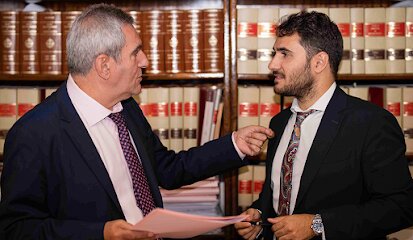Best Business Registration Lawyers in Palencia
Share your needs with us, get contacted by law firms.
Free. Takes 2 min.
List of the best lawyers in Palencia, Spain
About Business Registration Law in Palencia, Spain
Business registration in Palencia, Spain, refers to the legal process by which individuals or entities formally establish a business within the jurisdiction of Palencia. This process ensures that a business operates within the framework set out by both national Spanish law and local regulations enforced by the provincial and municipal authorities. Registration is required before conducting any commercial, professional, or industrial activity and involves several administrative steps such as choosing a business structure, obtaining tax identification, and registering with relevant governmental bodies. The ultimate aim is to ensure transparency, protect consumer rights, and encourage lawful business practices.
Why You May Need a Lawyer
Navigating the business registration process can be complex, particularly if you are unfamiliar with Spanish laws or new to doing business in Palencia. Common situations where legal assistance proves valuable include choosing the most suitable legal form for your business, understanding compliance requirements, drafting foundational documents such as articles of association, handling registrations with multiple authorities, managing the transfer or sale of a business, and resolving disputes that arise during or following registration. Legal professionals can help identify potential risks, prevent costly mistakes, and ensure your business meets all regulatory requirements from the outset.
Local Laws Overview
In Palencia, business registration is governed primarily by national Spanish legislation, such as the Código de Comercio (Commercial Code), Ley de Sociedades de Capital (Companies Act), and supporting tax and labor laws. Additionally, local regulations apply at the provincial and municipal levels. Key aspects include:
- Choosing a business structure: such as sole proprietorship (autónomo), partnership, limited liability company (Sociedad Limitada or SL), or public limited company (Sociedad Anónima or SA).
- Reserving a company name and registering it with the Registro Mercantil Central or local Mercantile Registry.
- Obtaining a tax identification number (NIF or CIF) from the Agencia Tributaria (Tax Agency) and registering for the Impuesto sobre Actividades Económicas (Economic Activities Tax).
- Filing company deeds with a notary public and registering with the Mercantile Registry in Palencia.
- Communicating the start of business activity to the local Town Hall (Ayuntamiento) and, where applicable, applying for special permits or licenses.
- Complying with social security requirements for both the employer and employees.
Frequently Asked Questions
What types of business structures can I register in Palencia?
The most common options are sole proprietorship, partnership, limited liability company (SL), and public limited company (SA). Each structure has distinct legal and tax implications.
Is it mandatory to register my business in the Mercantile Registry?
Yes, all companies apart from sole proprietors must register with the Mercantile Registry. Sole traders register with the Tax Agency and local Town Hall.
Can non-Spanish citizens register a business in Palencia?
Yes, non-Spanish citizens can register a business in Palencia. However, certain documentation will be required, such as a Foreigner Identification Number (NIE) and supporting visa or residency documents.
What documents are needed to register a limited company (SL)?
You will need a company name certificate, the company's founding deed signed before a notary, proof of capital contribution, and application forms for the Mercantile Registry and Tax Agency.
How long does the registration process typically take?
The process can take from a few days to several weeks, depending on the business structure, completeness of documents, and efficiency of local administrative bodies.
Do I need special permits or licenses for my business?
Depending on your activity, you may need municipal or sector-specific licenses. It is essential to check with the local Town Hall and relevant authorities in Palencia.
What are the tax obligations after registration?
You must register for the Economic Activities Tax, submit periodic VAT returns if applicable, and comply with corporate income tax and social security obligations.
Can I register my business online?
Some steps can be handled online through platforms such as the Punto de Atención al Emprendedor (PAE) or the Agencia Tributaria’s electronic office. However, some procedures may require in-person visits, particularly when signing documents before a notary.
What happens if I operate without registering?
Operating an unregistered business is illegal and may result in fines, closure orders, and liability for back taxes and social security contributions.
Do I need a business address in Palencia?
Yes, you must provide a registered address for your business within Spain, and specifically within Palencia if you plan to operate locally.
Additional Resources
- Palencia Mercantile Registry (Registro Mercantil de Palencia) - for company registration procedures. - Palencia Town Hall (Ayuntamiento de Palencia) - for municipal licenses and local regulations. - Agencia Tributaria (Spanish Tax Agency) - for tax identification numbers and tax obligations. - Confederación Palentina de Organizaciones Empresariales (CPOE) - provides advice to entrepreneurs. - Punto de Atención al Emprendedor (PAE) - for online guidance and document processing. - Official College of Notaries of Castilla y León - for notarization services. - Social Security Treasury (Tesorería General de la Seguridad Social) - for social security registration.
Next Steps
If you are considering registering a business in Palencia, begin by defining your business model and choosing the most suitable legal structure. Collect the necessary documentation, including proof of identity, company name certificate, and founding documents. Engage with a qualified legal advisor or local lawyer experienced in business registration to help you navigate the process, draft required documents, and represent your interests before various public authorities. Visit or contact the relevant institutions, such as the Mercantile Registry, Tax Agency, and local Town Hall, to ensure all applications are properly submitted. Early legal guidance can help you avoid delays, penalties, and ensure your business is fully compliant with local and national regulations from the outset.
Lawzana helps you find the best lawyers and law firms in Palencia through a curated and pre-screened list of qualified legal professionals. Our platform offers rankings and detailed profiles of attorneys and law firms, allowing you to compare based on practice areas, including Business Registration, experience, and client feedback.
Each profile includes a description of the firm's areas of practice, client reviews, team members and partners, year of establishment, spoken languages, office locations, contact information, social media presence, and any published articles or resources. Most firms on our platform speak English and are experienced in both local and international legal matters.
Get a quote from top-rated law firms in Palencia, Spain — quickly, securely, and without unnecessary hassle.
Disclaimer:
The information provided on this page is for general informational purposes only and does not constitute legal advice. While we strive to ensure the accuracy and relevance of the content, legal information may change over time, and interpretations of the law can vary. You should always consult with a qualified legal professional for advice specific to your situation.
We disclaim all liability for actions taken or not taken based on the content of this page. If you believe any information is incorrect or outdated, please contact us, and we will review and update it where appropriate.











